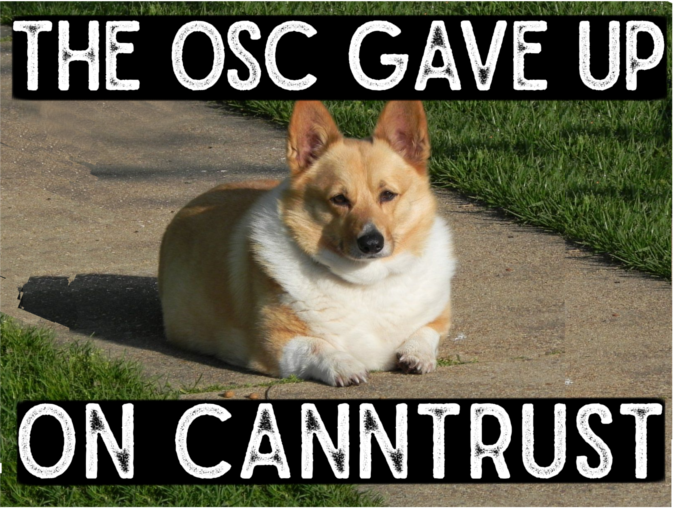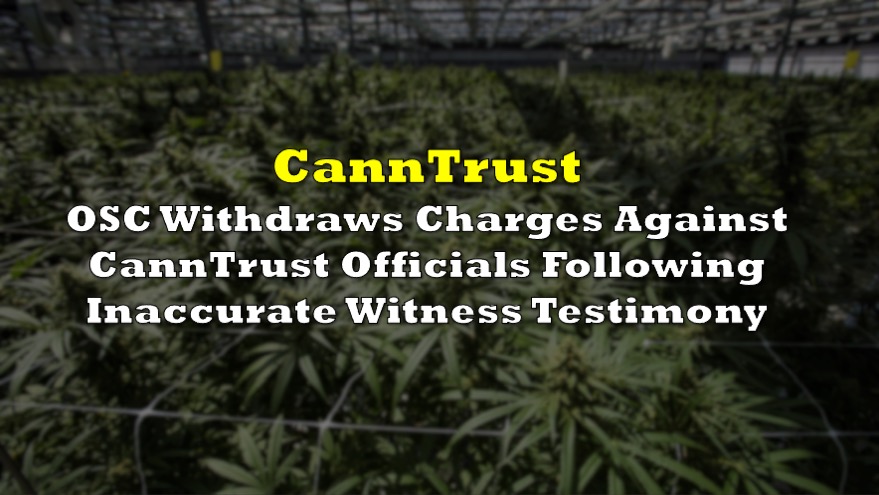Ontario’s securities Watchdog, pictured here in hot pursuit of CannTrust executives doing fraud.
Best-in-class financial columnist Matt Levine frequently points out that, if a company is a reporting issuer, then anything a company does, but isn’t supposed to do, that causes a sudden or even gradual drop in its stock price, can be considered securities fraud.
It doesn’t matter if the Bad Thing was legal or not, and it doesn’t even have to be a Thing the company did actively. It could be a Thing that was done to them, or a Thing that was done that affected them. What really matters is that the company knew of the Thing and lied about it, either directly or by omission.
“Everything is Securities Fraud” is a running bit over at Levine’s Bloomberg column. He makes hay out of SEC complaints against Sea World for not being forthcoming with investors about the potential damage that could be caused by the Blackfish documentary, and against Goldman Sachs, which was accused by the SEC of securities fraud for not having disclosed to its shareholders that it was… conducting another instance of securities fraud. It’s securities fraud all the way down.
Dudley Do-Nothing
The principle is the same up here in Canada, where three former executives of former cannabis company CannTrust Holdings are being prosecuted by the Ontario Securities Commission for filing a false prospectus that solicited the sale of CannTrust stock to investors, but failed to mention the un-licensed cultivation that turned into the high-profile 2018 scandal that led to the company losing its license all together. Or, rather, they were being prosecuted, until yesterday.
OSC prosecutors moved to withdraw charges against former CannTrust CEO Peter Aceto, former CannTrust Chairman Eric Paul, and former CannTrust Director Lark Litwin yesterday, following what sounds like an outstanding cross-examination of the government’s key witness, former CannTrust Director of Quality and Compliance Graham Lee.
The account of The Globe and Mail‘s Greg McArthur, makes it sounds like the defense was able to cross Lee up on the semantic difference between ‘unlicensed’ and ‘illegal,’ then get Lee to admit that he was “at times,” confused regarding the operation of the Cannabis Act and its regulations.
While Lee is surely pivotal to the OSC’s case, we don’t see how the defense’s attempt to paint him as an inept bumbler who didn’t understand his job would make the OSC’s case less sound, or even more difficult to make. It’s Lee’s 2018 emails to the defendants, his superiors at the time, that implicate them in the un-sanctioned cannabis production, and concurrent cover-up that eventually cost the company its license, and it’s difficult to see how anything he says about them now could be relevant.
Excerpts of those emails published by The Globe and Mail in 2019 show that they informed former CEO Peter Aceto, and former Chairman Eric Paul that the company had “dodged some bullets,” following a November, 2018 Health Canada inspection in which the inspectors failed to ask about “unlicensed rooms currently full of plants.” It also outlines a number of “current risks,” including a “large number of lost bottles (of weed) we have not reported.”
Lee’s email gives his bosses specific information about where everything is, what rules are being broken, and what rules they intend to break.
“1) RG8 is not licenced but has plants in it; 2) RG9 is not licenced but we are intending to put plants in it on Monday; 3) PA2A-E are not licenced but we have moved the encapsulation equipment into them and will begin running it next week.”
They sure seem like emails from a Director of Quality and Compliance who understands the Cannabis Act, and understands when the company is complying with it and when it isn’t. It also seems like that Director of Quality and Compliance is creating a detailed paper trail of the non-compliance he’s been instructed to undertake, directly addressed to the people who have instructed him to undertake it. Lee’s apparent 2022 under-pressure revelation that he was kind of confused about it sometimes doesn’t make them not emails to his bosses about how they were getting away with breaking the rules.
Even if Aceto and Co.’s legal team put on their best Johnny Cochran, and convince a judge that Lee was a bumbling oaf who didn’t understand his job, we don’t see how it gets these executives off the hook, because they hired him, and kept him around. Even if he was really bad at his job, but really good at pretending he wasn’t, and had them all fooled, he’s still their Director of Quality and Compliance, sending them emails about the ways in which the facility they manage in the interests of the shareholders was breaking the rules, and metaphorically comparing being caught breaking those rules to being shot.
It wouldn’t matter if Lee suddenly stood up on the chair in the witness stand, ripped all his clothes off and pledged his mortal soul to Lan’yard, the Dark Lord of Middle Management. He sent those emails to the defendants, his bosses, in his official capacity in 2018. Whether he understood the technicalities of what was and wasn’t licensed isn’t the point: the company wasn’t allowed to grow weed there, the defendants were told so, and they didn’t do anything about it.
None of them replied to Lee’s email with, “are you sure we aren’t allowed to grow weed there?” or “what the hell are you doing growing weed where you aren’t supposed to!? Get up to my office right now so that I can fire you!” The only reply from the defendants that The Globe references is from Eric Paul. It suggests they whine to Health Canada some more about how long all of this was taking. As near as we can tell, Lee was still on the job in July of 2019 when Aceto was terminated with cause and Paul resigned his position.
The OSC shouldn’t need Lee or his emails: CannTrust told on itself
If every copy of those emails was vaporized by a spell conjured by the dark majick of Mor’log The Tedious, who reigns supreme over corporate paperwork, it still wouldn’t matter, because the executives represented to shareholders that those rooms were cleared for production when they filed a prospectus soliciting the purchase of the company’s capital stock and, according to Health Canada, the final authority on where a company is and isn’t allowed to grow weed, they weren’t.
When the story first broke in 2019, Fundamental Hype pointed out that a table titled Operational Overview, published in CannTrust’s MD&A for the period ending Dec. 31, 2018 showed that the area Health Canada would eventually cite as the site of unlicensed cannabis production was both in production and licensed for cultivation and sale of 50,000 kg of cannabis per year.

If there weren’t emails showing their active compliance in non-compliance, Aceto and his crew arguing that they were running a clean shop, and just didn’t realize that their paperwork wasn’t in order, would actually be pretty believable. Aceto especially was so busy touting the capacity and capability of those unlicensed rooms to investors that he might not have time to look into it.
The Bankman-Fried, “I’m actually just terrible at my job,” defense being believable doesn’t make it a very good defense for securities fraud or anything else, but maybe these OSC prosecutors can relate.
A securities commission willing to walk away from defendants that they have dead-to-rights because their lawyers tongue tied a witness can’t be taken seriously, and it’s fair to wonder if the OSC knows that or cares. We should find out today if it plans to withdraw the charges, as it moved to do Wednesday, or concede to the judge dismissing them all together, as the defense has requested. When it comes down to actually making a fine or jail time stick for these executives, it doesn’t seem like the OSC prosecutors have their hearts in it. Aceto may have been counting on that.
Information for this briefing was found via Sedar, Bloomberg, and the sources mentioned or linked. The author has no securities or affiliations related to this organization. Not a recommendation to buy or sell. Always do additional research and consult a professional before purchasing a security. The author holds no licenses.








